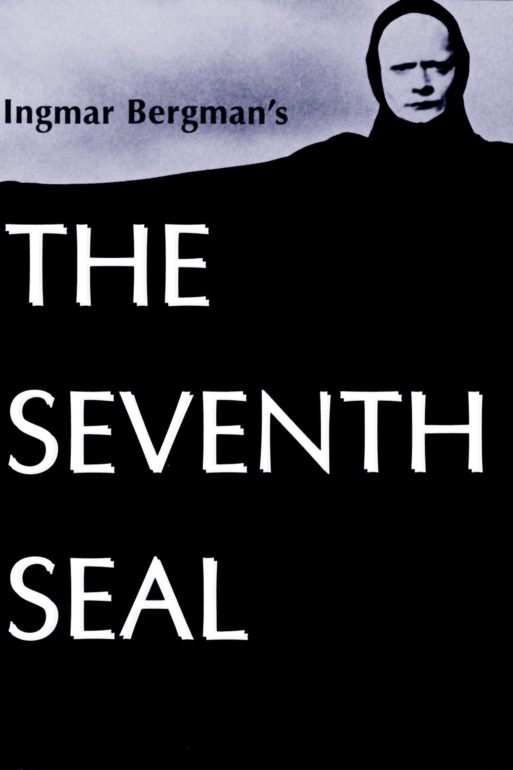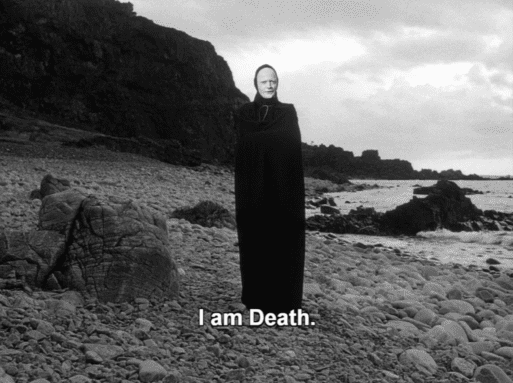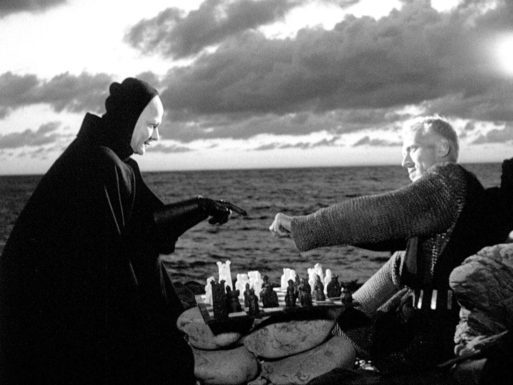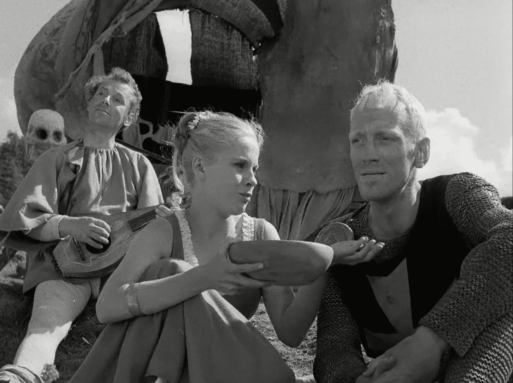
Credit: Janus Films
I would like to begin this post by saying that I do NOT recommend “The Seventh Seal” to anyone who is grieving, nor those coping with the impending loss/current illness of a loved one.
However, if you are philosophically interested in reflecting on your own mortality, or on a spiritual journey to embrace death as a universal human experience, then this one’s for you.
 “The Seventh Seal” was directed by Ingmar Bergman and released in 1957. Set in medieval Sweden, it is about a knight named Antonius Block, who has returned home from the Crusades during the Black Plague. He is walking on the shore when he encounters Death, personified as a sort of Grim Reaper figure, who informs him that his time is up. “Are you prepared?” Death asks the knight. In an effort to buy himself more time in life, Antonius challenges Death to a game of chess. Death agrees, and so the game unfolds over several days.
“The Seventh Seal” was directed by Ingmar Bergman and released in 1957. Set in medieval Sweden, it is about a knight named Antonius Block, who has returned home from the Crusades during the Black Plague. He is walking on the shore when he encounters Death, personified as a sort of Grim Reaper figure, who informs him that his time is up. “Are you prepared?” Death asks the knight. In an effort to buy himself more time in life, Antonius challenges Death to a game of chess. Death agrees, and so the game unfolds over several days.

Antonius and Death play a two-day game of chess, as Antonius grapples with his mortality.
It is this brief period of suspension between life and death that makes up the film. I won’t give away the plot, but the film is allegorical and elegiac, and rich with symbolism. The knight’s story is seemingly simple, but it gestures towards profound questions, like the meaning of life, the existence of God, and the nature of death. It has a quiet and contemplative way of musing on themes around redemption, faith and morality.
While he is evading death and grappling with his existential crisis, the knight meets a cast of characters, all of whom help him make sense of life’s mysteries. It’s not unlike, say, “The Wizard of Oz,” in which the characters are archetypes that represent different paths in life, or different philosophies, which add layers to the protagonist and help them develop while they are struggling.
In one dreamy moment in the film, Antonius is sharing a simple meal of strawberries and milk with a young family whom he befriends. They are of meager means, but appear joyful, in love and creative. He says:
I shall remember this hour of peace: the strawberries, the bowl of milk, your faces in the dusk. Mikael asleep, Jöf with his lute. I shall remember our words, and shall bear this memory between my hands as carefully as a bowl of fresh milk.

“The Seventh Seal” is quite a dark film in some ways; parts of it are even grotesque and haunting, which is why I do not recommend it for someone who has recently suffered a loss. But it is also a beautiful, poetic piece of classic cinema. If you are open to watching something that might challenge or expand your thinking around mortality, and you appreciate artistic cinema, definitely give “The Seventh Seal” a watch. It is available on several streaming services. You can watch the official trailer below.

 “The Seventh Seal” by Ingmar Bergman
“The Seventh Seal” by Ingmar Bergman


 “Help Me, Helen”
“Help Me, Helen”
 Recovering Cremation Remains After the Los Angeles Fires
Recovering Cremation Remains After the Los Angeles Fires
 “As Tears Go By” by Marianne Faithfull
“As Tears Go By” by Marianne Faithfull














